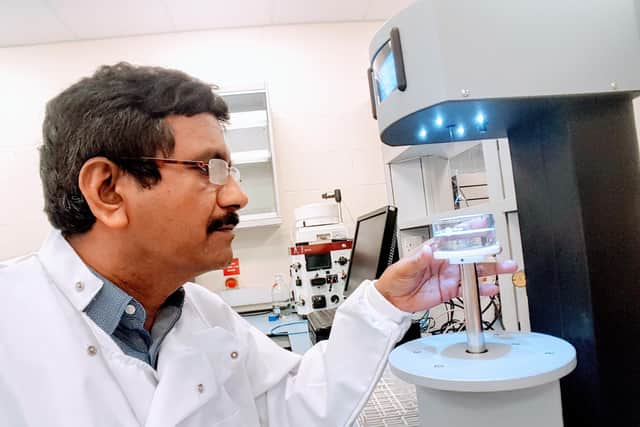University of Portsmouth scientist believes human waste is key to identifying coronavirus hotspots
and live on Freeview channel 276
With the virus having already been detected in the faeces of coronavirus patients in the Netherlands, USA, France and Australia, Dr Pattanathu Rahman, a microbiologist at the University of Portsmouth, believes monitoring sewage could hold the key to identifying Covid-19 hotspots which need intervention.
A team led by Dr Rahman is advocating the study of sewage filtering systems to identify the presence of the virus.
Advertisement
Hide AdAdvertisement
Hide AdDr Rahman said: ‘Despite the advancements being made in medicine and research, it is proving difficult to contain this virus. It’s highly likely that the virus survives in wastewater, so we looked at using nanofiber filters as a wastewater pre-treatment routine and the upgrade of existing wastewater evaluation and treatment systems to serve as a surveillance tool.


‘It’s nearly impossible to test every individual in a pandemic, so it’s critical we locate the hotspots of the disease and begin isolation and treatment from there.’
The strategy has previously been used to track and help eliminate viruses including poliovirus and aichivirus.
However, being able to monitor effectively depends on a range of factors, including sanitary and climatic conditions, rainfall and filters. While the method would not identify individuals with coronavirus it could be used to identify locations where there is a high prevalence rate.
Advertisement
Hide AdAdvertisement
Hide AdDr Rahman added: ‘Water treatment systems play a significant role in public health protection. Treated wastewater has a wide range of uses from drinking water, to being used for irrigation and food production.
‘There is significant risk the virus can be transmitted through sewage and it’s possible slimy bacteria that forms a thin coat over sewage pipelines could help spread of the virus.’
A message from the Editor
Thank you for reading this story on portsmouth.co.uk. While I have your attention, I also have an important request to make of you.
With the coronavirus lockdown having a major impact on many of our advertisers - and consequently the revenue we receive - we are more reliant than ever on you taking out a digital subscription.
Subscribe to portsmouth.co.uk and enjoy unlimited access to local news and information online and on our app. With a digital subscription, you can read more than 5 articles, see fewer ads, enjoy faster load times, and get access to exclusive newsletters and content. Visit our Subscription page now to sign up.
Our journalism costs money and we rely on advertising, print and digital revenues to help to support them. By supporting us, we are able to support you in providing trusted, fact-checked content for this website.
Comment Guidelines
National World encourages reader discussion on our stories. User feedback, insights and back-and-forth exchanges add a rich layer of context to reporting. Please review our Community Guidelines before commenting.